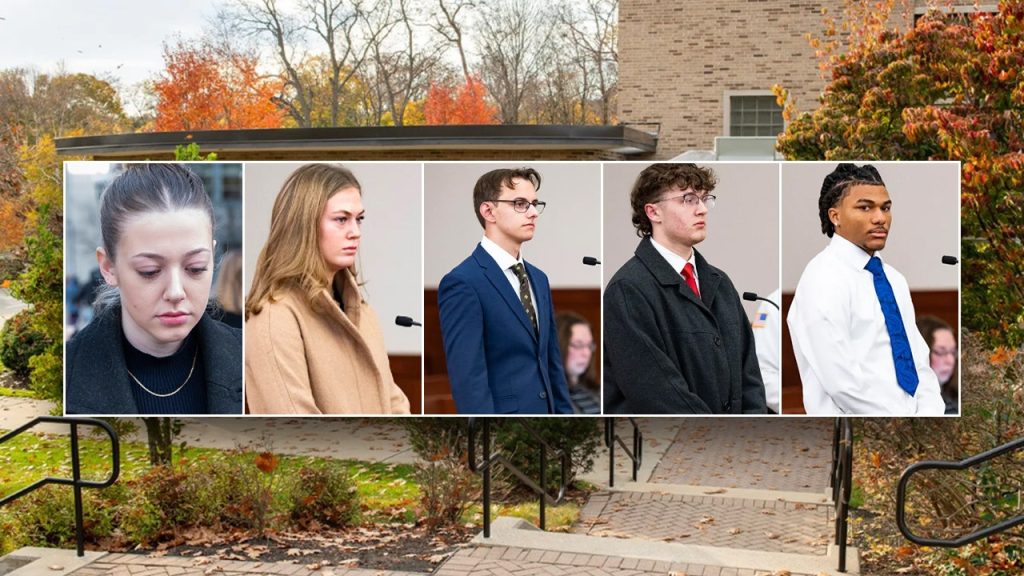This incident revolves around a “To Catch a Predator”-inspired prank orchestrated by five Assumption University students, which escalated into a physical assault on a 22-year-old Army soldier. The students, Easton Randall, Kevin Carroll, Isabella Trudeau, Joaquin Smith, and Kelsy Brainard, allegedly used the dating app Tinder to lure the soldier onto campus under the guise of a potential hookup. Brainard, whose Tinder account was used to initiate contact, portrayed herself as 18 years old. The soldier, who had just attended his grandmother’s funeral, agreed to meet Brainard on campus, seeking solace and companionship in the aftermath of the service. Police investigations, including review of the Tinder exchange and Brainard’s profile, found no evidence to suggest the soldier was seeking underage encounters, indicating he was using the app for its intended purpose of initiating casual connections.
Upon the soldier’s arrival, the situation quickly devolved. A large group of 25-30 students, seemingly alerted and mobilized by the accused quintet, ambushed the soldier, accusing him of being a pedophile interested in underage girls. Surveillance footage documented the group encircling and preventing the soldier from leaving, effectively trapping him. Though he managed to break free, the crowd pursued him, recording the chase on their phones. During this pursuit, a juvenile student, also implicated in the incident, allegedly punched the soldier in the back of the head. Carroll is further accused of slamming the soldier’s head into his car door as he attempted to escape in his vehicle, while other students reportedly kicked the car.
Following the assault, the group returned to the building, their celebratory high-fives and laughter captured on surveillance footage. Brainard subsequently reported to campus police that a “creepy guy” had come to campus seeking an underage girl, falsely claiming the soldier arrived uninvited and that she had summoned Randall for assistance. This narrative, however, was contradicted by evidence gathered from surveillance footage and interviews.
The incident came to the attention of authorities after Brainard’s misleading report and a separate report by the soldier to Worcester Police about an assault at Assumption University. Investigators uncovered a conspiracy among the five students to lure the soldier onto campus under the pretense of the “Catch a Predator” TikTok trend. This involved pre-planned text messages and coordinated actions to stage the confrontation and subsequent assault. The students reportedly admitted to planning the event, claiming it was inspired by the TikTok trend but spiraled out of control.
The core of the incident lies in the students’ misuse of a popular social media trend, “Catch a Predator,” which focuses on exposing individuals seeking inappropriate relationships with minors. This Trend, while potentially positive in exposing true predators, carries a significant risk of misidentification and vigilante justice. In this case, the students’ actions led to the false accusation and physical assault of an innocent individual. Their reliance on limited information, coupled with a desire for social media notoriety, fueled the rapid escalation of events. Their subsequent attempts to portray themselves as victims and shift blame further complicates the situation.
The legal ramifications for the students include charges of conspiracy and kidnapping. Carroll faces an additional charge of assault and battery with a dangerous weapon due to his alleged attack on the soldier. A sixth juvenile student is also facing charges related to the assault. The incident raises questions about the responsibility of social media platforms in monitoring and mitigating the potential harm associated with viral trends. It also highlights the importance of critical thinking and responsible use of social media, particularly in situations involving accusations and potential vigilantism.
The soldier’s vulnerability, grieving the loss of his grandmother and seeking connection, was exploited by the students’ ill-conceived plan. The incident underscores the ethical considerations of online interactions and the potential for manipulation and misrepresentation in the digital age. The soldier’s experience serves as a stark reminder of the need for caution and responsible engagement in online spaces.
This incident exposed a dark side of social media trends, highlighting how a pursuit of viral fame can lead to dangerous real-world consequences. The accused students, caught in the tide of a popular online challenge, crossed legal and ethical boundaries, causing significant harm to an unsuspecting individual. The case also underscores the importance of verification and responsible application of such trends, emphasizing that real lives are at stake beyond the confines of the internet. The legal proceedings and potential consequences for the students will likely serve as a deterrent against similar reckless actions in the future.










